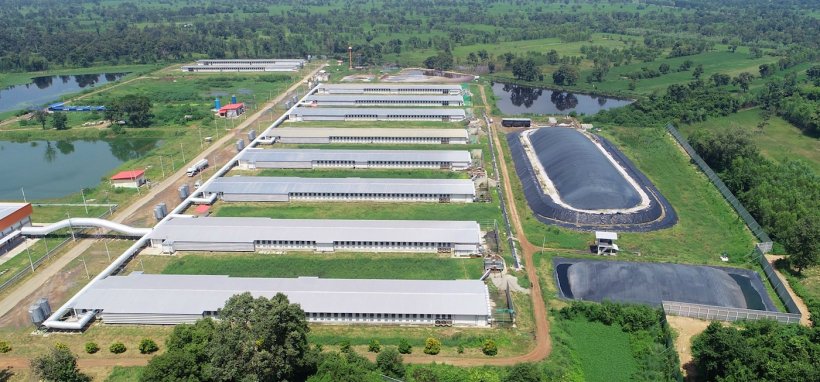 Charoen Pokphand Foods Public Company Limited (CP Foods) is leading the way in sustainable farming practices by unveiling plans to develop a prototype for a fully renewable energy-powered animal farm, dubbed the RE100.
Charoen Pokphand Foods Public Company Limited (CP Foods) is leading the way in sustainable farming practices by unveiling plans to develop a prototype for a fully renewable energy-powered animal farm, dubbed the RE100.
CP Foods is set on creating a future where every aspect of farm activities, including transportation, operates entirely on renewable energy. This comes as part of their commitment to achieve Net-Zero greenhouse gas emissions by 2050, marking a milestone in the path to sustainable food production.

The RE100 prototype farm incorporates an array of renewable energy sources, including solar panels installed across farms, feed mills, and food manufacturing facilities. This innovative model also features a waste-to-energy initiative, recycling waste into renewable power in alignment with the Circular Economy principle.
"CP Foods is committed to pioneering the food industry by integrating the highest proportion of renewable energy, such as solar, biomass, and biogas, into our operations," stated Peerapong Krinchai, Head of Engineering at CP Foods.
The company has set targets of increasing renewable energy use to 50% by 2030 and ultimately 100% by 2050. As of 2023, 30% of the energy used in the company business is from renewable sources, the renewable energy mix includes biomass (69%), biogas (29%), and solar energy (2%).
In line with the CP Coal Free 2022 policy, CP Foods has transitioned to using biomass fuels, effectively eliminating the use of coal in its Thailand and Vietnam operations. This switch has successfully cut greenhouse gas emissions by 180,000 tons of CO2 equivalents.
Furthermore, CP Foods is optimizing biogas energy by converting waste into renewable energy. A system processes wastewater sludge into biogas for electricity and decomposes waste into fertilizer, in keeping with the Bio-Circular-Green Economy (BCG) model. This initiative is currently operational in 98 pig farms and 7 laying hen complexes, reducing CO2 emissions by over 440,000 tonnes.
The company also aims to increase the utilization of solar power across its operations. By 2025, solar cells are projected to be installed across all CP Foods' locations, which includes over 208 farms and factories, generating an estimated total power capacity of approximately 100 megawatts.
In 2023, CP Foods is taking a leap forward by testing medium-sized electric trucks for internal transportation within its farms and factories. This marks another step in their journey towards a fully renewable energy-operated ecosystem, further reducing their reliance on fossil fuels and greenhouse gas emissions.
May 22, 2023 - CP Foods





